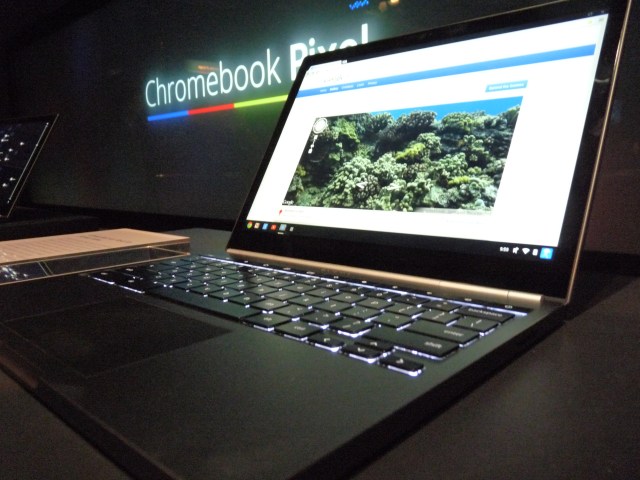After a few weeks of rumors, Google just announced the latest device in its Chromebook lineup: the Chromebook Pixel.
Unlike previous Chromebook versions, the Pixel is aimed at power users
who fully live in the cloud. The device features an impressive array of
hardware specs. It has a 12.85 inch high-density 2560×1700 screen
(that’s 4.3 million pixels) with a 3:2 aspect ratio, an Intel Core i5
processor and a whopping 1 terabyte of free storage on Google Drive for
three years.
Google will also soon launch a version with a built-in LTE radio and
has partnered with Verizon to offer 100 MB/month for two years of mobile
broadband and with GoGo to offer 12 free in-flight Wi-Fi sessions.
The Pixel’s screen, which is obviously the highlight of the device,
features a pixel density of 239 pixels per inch. That’s a bit higher
than the 220 pixels/inch on the Macbook Pro with a Retina display, so
Google proudly notes that its laptop “has the highest pixel density of
any laptop display.”
![]()
The basic Wi-Fi version of the Pixel will retail for $1,299 in the U.S. and £1,049 in the U.K. The Pixel is now available on Google Play and will also be available at select Best Buy locations in the U.S. and Currys PC World
in the U.K. tomorrow. The LTE version ($1,449) will ship in the U.S. in
April. The other difference between the LTE and Wi-Fi models is that
the LTE version will ship with a 64GB solid-state drive and the Wi-Fi
version will only have 32GB.
Google did not disclose who its hardware partners are, but the company did say that the device is being assembled in Taiwan.
“I think the hardware shines,” Google VP Sundar Pichai said at a
press event in San Francisco today. Google, Pichai stressed, wanted to
build a device for power users who live in the cloud. “There’s a set of
users who are really committed to living completely in the cloud,” he
said, and Google wanted to build the perfect laptop for them.

The first thing users will definitely notice when they first open the
Pixel is the screen. Not only does it have a very high resolution, but
it also features a relatively unusual aspect ration of 3:2. According to
Pichai, the reason for this was that Google looked at what people would
do with this device, and given that the web still focuses on content
that is meant to be displayed horizontally, the design team decided to
discard the idea of a screen with the more typical 16:10 resolution and
went with 3:2.
The screen, Google says, includes a 0.55mm layer of touch-enabled
Gorilla Glass fused directly to the screen. Google says this screen
“gives you smooth interactions while preserving picture clarity” and
after some hands-on time with the device, Google definitely isn’t
exaggerating the quality of the screen, which definitely measures up to
Apple’s Retina displays.
Google also stressed that this is a very premium device (something
that’s obviously reflected in the price). Pichai, for example, noted
that the piano hinge has the feel of a “very premium car door” and the
team added rounded corners to the aluminum body to make it feel better
when you hold it. Google also stressed that it redesigned numerous
components and often had to resort to designing its own parts to meet
its specs. The team, for example, added a third microphone to the device
so it not only cancels out background noise, but also the noise you
make yourself when you type on the keyboard (the Pixel has a 720p webcam
for Google Hangouts and other video chats, too).
![]()
Despite the premium price and components, Sundai stressed that the
overall philosophy behind the Chromebook project hasn’t changed. The
Pixel, however, is meant for power users. “We also wanted to design
something very premium for power users – people who spend money on their
laptops,” he said at today’s presentation. The idea behind Chrome,
Google says, “has always been to minimize the ‘chrome’ of the browser.
In much the same way, the goal of the Pixel is to make the pixels
disappear, giving people the best web experience.”
Chrome itself, of course, has also been optimized for touch, which
Pichai believes will soon be on every laptop. The menus are now larger
and easier to click on with your fingers.
Asked about how the Pixel compares to the Macbook Air, Pichai noted
that the Pixel has a higher resolution and a touch screen, something
Apple doesn’t currently offer – especially on a 12-inch device.
The price, of course, definitely puts the Pixel in a premium category
and it remains to be seen how the market will react to it. It is, no
doubt, the best Chromebook on the market today and the hardware,
including the fit and finish of the device, is very impressive. At
$1,299 for the basic version, though, some potential buyers may decide
to opt for a premium Apple laptop or Ultrabook instead.
Here are the full hardware specs:
![]() INPUTS
INPUTS
Gorilla® Glass multi-touch screen
Backlit Chrome keyboard
Fully clickable, etched-glass touchpad
HD Webcam
12.85″ display with a 3:2 aspect ratio
2560 x 1700, at 239 PPI
400 nit screen
178° extra-wide viewing angle
297.7 x 224.6 x 16.2 mm
2 x USB 2.0
mini-display port
2-in-1 card reader supporting: SD, MMC
INNARDS
Intel® Core™ i5 processor (Dual Core 1.8GHz)
Intel® HD Graphics 4000 (Integrated)
Built-in microphone array
Integrated DSP for noise cancellation
Powerful speakers tuned for clarity
Active cooling with no visible vents
Machined from anodized aluminum
Up to 5 hours of active use (59 Wh battery)
Dual-band WiFi 802.11 a/b/g/n 2×2
Bluetooth® 3.0
One terabyte of Google Drive cloud storage, free for 3 years
12 free sessions of GoGo® Inflight Internet






0 comments:
Post a Comment